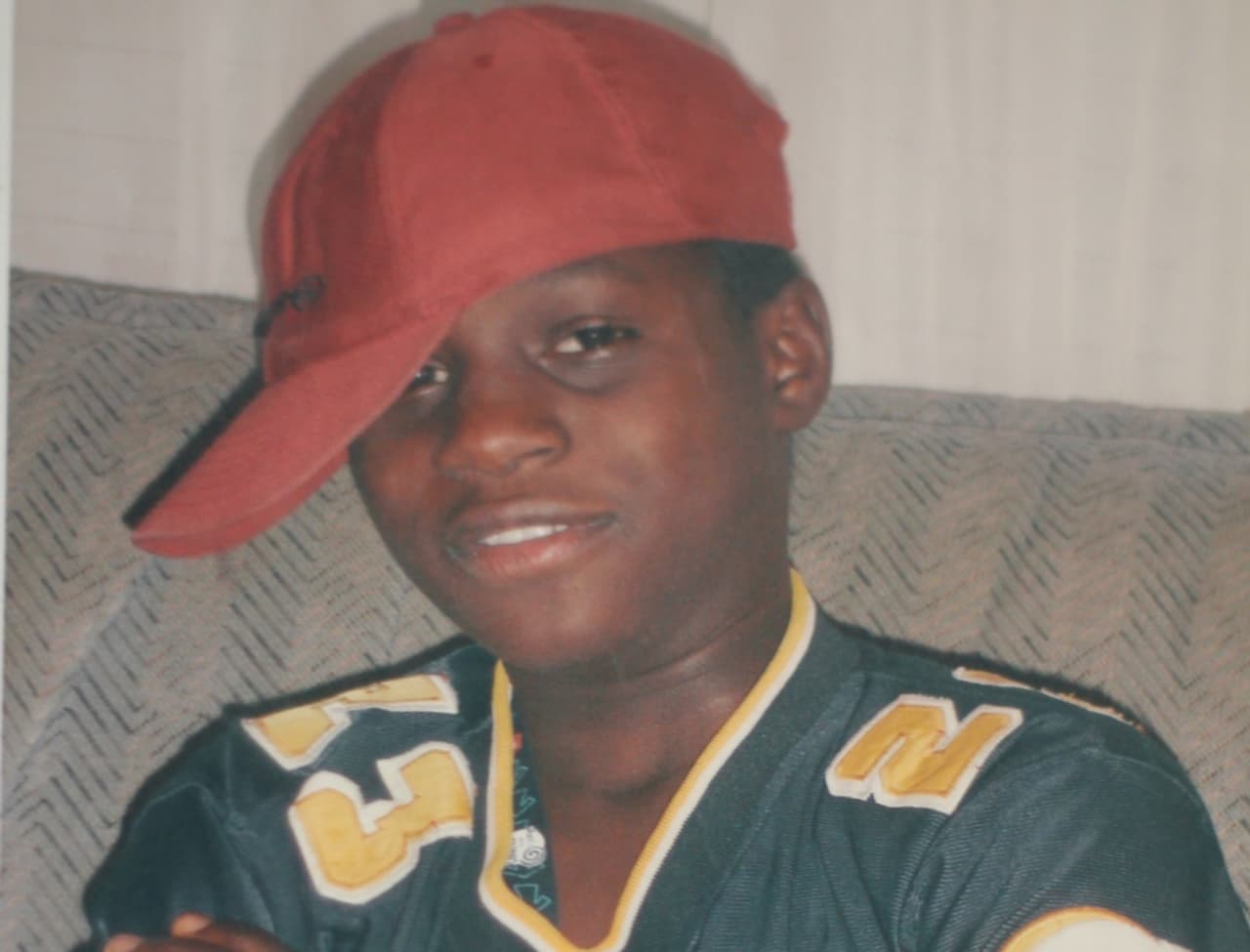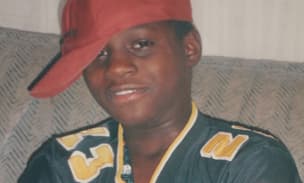
The 16 year old caught up in gang murder: teenager prosecuted by law examined in Jimmy McGovern’s drama ‘Common’
Tomorrow night, Jimmy McGovern’s new drama Common will air on BBC1. It tells the story of a teenage boy caught up in a murder and prosecuted under the little-known law of joint enterprise. The Bureau’s Maeve McClenaghan visited a London prison to talk to Edward Conteh, a young man who was prosecuted under that same law.
According to the courts Edward Conteh is a ruthless killer. He is serving time for manslaughter and, as a foreign national prisoner, is a prime candidate for deportation once he’s served his minimum term. But when I visit Conteh in a prison on the outskirts of London, I meet a young man who took no part in the actual killing he was convicted for. He never held a weapon or even saw the violence take place. But he is a young man who, through a technicality of the law, is serving time for a crime he played no active role in.
The rain is lashing down outside but is of no concern to the inmates of HMP Isis. Many are gathered in the visitors centre awaiting a rare chance to catch up with life from the outside world. Amongst them sits 20 year-old Edward Conteh, smartly dressed in an oat-coloured wool sweater and jeans. He has turned down the offer of tea or coffee and has plumped instead for a carton of Ribena. His fingers fiddle anxiously with the carton while we talk, he is a ball of energy in a too-small cage.
Conteh has spent a little over three years in prison. There is not a day that passes that he hasn’t thought about how he ended up amongst thieves and killers.
‘I didn’t do anything,’ Conteh explains. ‘I was just a kid really, it was my mates from school said come out with them so I went, I didn’t know what was going to happen.’
Conteh was convicted under the little-known law of joint enterprise, which allows a jury to convict those on the periphery of a crime on the same charge as those that committed the deed.
Scooped up
The law enables the convictions of serious criminals complicit in complex crimes. But, top lawyers worry that the law also leads to people being scooped up into prosecutions for crimes that they never intended to happen.
‘I hadn’t heard of joint enterprise at all before, even at the trial I didn’t believe that you could get put in prison for a crime if you didn’t do it,’ Conteh explains. When he arrived in prison he started asking around about the law. ‘A lot of people in here were done under joint enterprise,’ he explains, glancing round the room.
Conteh was 16 years old when the murder happened. It was a summer’s day like any other and his school mates were at his house playing Playstation. After a few hours of mucking around they convinced Conteh, who wanted to wait at home for a girlfriend’s visit, to come with them to the local park. On the way he heard smatterings of a story – earlier some of his school friends, who were part of the ‘SG’ gang had had a run in with some lads from another local gang, the Sydenham Boys. Now they were on their way to the park, Conteh discovered, to find out what was going on.
When they arrived there was something of a show-down: lots of shouting and posturing. Some of the boys had brought knives and waved them about. Soon the Sydenham Boys ran off. Conteh had seen these kind of stand-offs before, but this one was to take a tragic turn.
Nicholas Pearton, a friend of the Sydenham Boys, arrived in the park after the others had left. All alone, he was an easy target and was chased out of the park by one of the boys with Conteh: Dale Green. Green caught up with Pearton down the road and stabbed him in the back, the boy stumbled into a take-away shop bleeding. He was taken to hospital where he died from the stab wound.
At the time of the attack Conteh was back in the park, he’d picked up a bike one of the other gang had dropped and was messing around with it. CCTV footage from the street shows him slowly cycling up the road to catch up with his retreating friends, minutes after the stabbing took place.
‘The guy that did the stabbing, he ran off forward by himself, then some of the others followed, but I was back in the park,’ says Conteh, leaning forward earnestly. ‘I’ve gone over it and over it in my head and thought what I could of done, but I didn’t see it happen, I wasn’t there so it’s not like I could have stopped it. Maybe I would have done it differently now, you know now I’m older, but I was just young then,’ he sighs.
The police grouped him in with the other boys that were there, and soon they were on his trail.
I meet Conteh’s mother, Memunatu, in her flat in South London. As we speak, her two youngest children, a four-year-old girl and a two-year-old boy are bouncing around the place. Memunatu was heavily pregnant with her youngest daughter during Edward’s trial. The boy, Edward’s half-brother, was born while he was in prison, so they do not know each other.
‘Two days later the plain clothes police came to my house and they said they’d come for Edward, they entered the house and went in Edward’s room and asked me some questions,’ she explains. They were looking for weapons but did not find any.
At the trial it was never argued that Conteh had a weapon or took any part in the violence. The CCTV footage showed he was not at the scene, and testimony from a psychologist explained that Conteh had an unusually low IQ which meant he was particularly compliant and unable to foresee consequences like others.
‘In the court they didn’t really talk about me, like [the judge] barely mentioned my name,’ he says. ‘I think [the jury] just thought “he is part of that group and they all did it”’.
The law in practice
The law of joint enterprise means that if a person’s presence at the crime can be viewed as encouraging or facilitating the act, then that person can be found guilty too. The jury decided that Conteh had been at the park and could have foreseen serious harm might be meted out, and so, following the steps to verdict laid out by the judge as guidance, they were obliged to find him guilty of manslaughter.
‘At the end of the trial we all thought he’d come home. Edward said “I’ll be free from this case today”, so when I heard they gave him manslaughter I nearly collapsed because I couldn’t believe it,’ says Memanatu.
‘When I got sentenced it was by videolink,’ explains Conteh. ‘Even then I thought I am going home, this was a big mistake, I never thought I’d get manslaughter. I just got taken from the video room back to my cell and that was it.’
Francis FitzGibbon QC is the barrister who defended Conteh during his trial. He says the law of joint enterprise can ‘work like a drift net, catching little fish as well as big ones, and lumping them together’.
FitzGibbon believes that the teenager’s conviction was unduly harsh. ‘I think Edward should have been acquitted of all homicide charges,’ FitzGibbon says. ‘The jury were welcome to convict him of affray [a significantly less serious charge]. But it’s a real stretch to convict him of a homicide offence. Foreseeing that someone might come to some harm should not be enough to find you guilty of a homicide offence. The law doesn’t take into proper account the grey areas and can sweep up defendants who are vulnerable and compliant and lacking the mental capacity to act differently.’
Conteh’s is not an isolated case. However, there are no official records which show how often joint enterprise is used to prosecute. While the CPS and Home Office record a wealth of data about crime, there is no check-box to record joint enterprise.
The Bureau of Investigative Journalism spent eight months interviewing experts, surveying lawyers and digging into crime statistics to find out more about the law. Figures were collated from the Crown Prosecution Service (CPS) for homicides involving multiple defendants, on the basis that these convictions would indicate the use of joint enterprise.
Figures analysed by the Bureau show that between 2005 and 2013, 4,590 people were prosecuted for homicides involving two or more defendants – a definition the CPS suggests is a clear indication of the use of joint enterprise. Within that figure, 1,853 people were prosecuted for homicides that involved four or more defendants.
Those people had varying levels of role in the crimes, some played an active part, others, like Conteh, might have been caught up through association.
The Bureau’s research also found a growing chorus of concern from those in the legal profession about the safety of the doctrine. Senior figures said they felt it needed reform.
The criminal Law Commissioner, Professor David Ormerod, told the Bureau the case for reform was ‘overwhelming’ as joint enterprise was ‘unclear’ and posed ‘a risk of injustice’.
Lord Phillips, former Lord Chief Justice, told the Bureau joint enterprise needs reform as it was ‘capable of producing injustice, undoubtedly’.
Proving foresight
The main concerns for lawyers were that there is no scientific way to prove or disprove encouragement or foresight that a crime may happen- it is often the CPS’s argument against the defendants. Another serious concern was that murder convictions come with mandatory life sentences – while Conteh was found guilty of manslaughter, he was also up for a murder charge. If he’d been found guilty of that he could have been sentenced to 12 years or more.
Not one of the legal experts consulted in the Bureau’s research argued that the joint enterprise doctrine should be scrapped- all recognised it is as a necessary part of the law which allows the genuinely guilty to be punished. Instead most advocated reforming the doctrine to ensure that those caught up in the system were not unduly punished.
Suggestions for ways to reform the law included writing the law into statute, or using case law to clarify some of the more nebulous issues in the doctrine’s use.
Some lawyers, including Law Commissioner Ormerod, suggested reforming the sentences for murder, creating a graded system to allow judges more discretion in sentencing those on the periphery of a crime.
But Justice Minister Damian Green told the Bureau there were no plans to reform joint enterprise.
‘Sentencing in individual cases is a matter for the courts. We have no plans to change the law in this area,’ he says.
However, as the Law Commission and other experts explained to the Bureau, the strict limitations on sentencing in murder cases, actually gives judges little leeway when it comes to sentence lengths.
Green explained: ‘Joint enterprise law has enabled some of the most serious offenders to be brought to justice. It ensures that if a crime is committed by two or more people, all those involved can potentially be charged and convicted of that offence.’
In 2011 the Justice Select Committee held an inquiry into the law. Evidence was heard and recommendations made, including the Law Commission who put forward ideas they had outlined in a report about those who participate on the peripheries of crimes. Their recommendations were praised by the committee.
In May this year it was announced that the committee would be holding a follow-up inquiry into the law to explore if the recommendations had had an effect.
But as Shadow Attorney General Emily Thornberry explained, many of the recommendations already put forward to the government have been ignored. She said: ‘It seems absurd that the Government has praised and accepted the Law Commission’s recommendations on joint enterprise and yet has done nothing to implement them. Instead ministers have filed the issue on a shelf marked “too difficult to deal with”. This is very disappointing as it’s not an issue that’s going to go away.’
A CPS spokesperson said: ‘We know this is a complex area of law that divides opinion but there are a number of cases, including the murder of Stephen Lawrence, that would not have seen anyone convicted for very serious crimes if not for joint enterprise. The CPS does not make the law, it applies it as directed by Parliament and the courts.’
No appeal
All that is little comfort to Conteh. The week before we meet he found out his application to appeal his conviction was turned down, a fact which came as a surprise to his lawyers and to him.
‘When I heard my appeal was turned down I was really sad, I felt like I had no more hope, like it was all hopeless,’ he says. ‘It’s hard, prison is a hard place, I just want to leave now, that’s all I think about: getting home.’
Even if his appeal had been allowed the chances of his conviction being overturned would have been slim. The Bureau analysed over 800 Court of Appeal rulings from 2008, 2012 and 2013 and found that the number involving joint enterprise had doubled in those years, from 11% of all published rulings in 2008, to 22% in 2013.
Despite the frequency with which cases were appealed, convictions were very rarely overturned. Only four of the 38 joint enterprise homicide convictions appealed in those years were quashed.
But Conteh faces a further complication. He has served the minimum term on his sentence and is due for parole in July. However, because he has Belgian citizenship, gained when his family sought asylum fleeing Sierra Leone, he now faces a deportation hearing to decide whether to remove him to Belgium.
He moved to the UK at the start of secondary school, and has no friends or family back in Belgium.
‘I don’t really remember much of Belgium, I was really young, I came here for secondary. I didn’t really have any friends there, there’s lots of racism you know,’ he says.
‘This is a really confusing time, I don’t know what is going to happen next,’ he says. In some ways he is counting down to his release date, but at the same time he knows it might never come, if the Home Office decides to remove him from the country.
‘It doesn’t seem right for them to send me away for something I didn’t do,’ he says sadly. His lawyers have told him that at the immigration hearing he will not be able to argue that he played no real role in the killing, all the judges will see is his conviction for manslaughter.
His mother Memunatu remembers more of their life in Belgium, she says the family was not happy there and faced racism. Now she worries about his future. ‘When he goes they’ll give the Belgian police everything and tell them that Edward is a criminal,’ she says. ‘And his family is all here, he doesn’t have anyone there, that can make someone go crazy,’ she says.
Life in prison has been hard on Conteh, it is his first time in incarceration and he says being faced with people coming in and out of the system has been tough, especially when he thinks he does not deserve to be there.
He gets one and half hours outside of his cell each day, for exercise and lunch. The rest of the time, he explains, he spends sitting around thinking. ‘Sometimes I get feeling so stressed out like I don’t know what to do, like I can’t take it anymore, and there’s no where to go to make it better – that’s the worst,’ he says.
His mother is more forth-coming on the subject. ‘Every time I’d go [to visit him when he was in the young offenders section] he was crying cos he’d never left his family before, crying can we try and take him out of there,’ she says.
The guards shout that visiting hours are over and it is time for us to make our way out, through the air-lock style security doors to find the rain has cleared and the sun is out. Conteh is heading back to his cell. Before I leave he leans over, flicking the last of his shredded juice carton from his fingers. ‘It’s hard you know, spending all this time thinking about things, how I’m in here even though I never did anything. This has turned my life upside down.’




